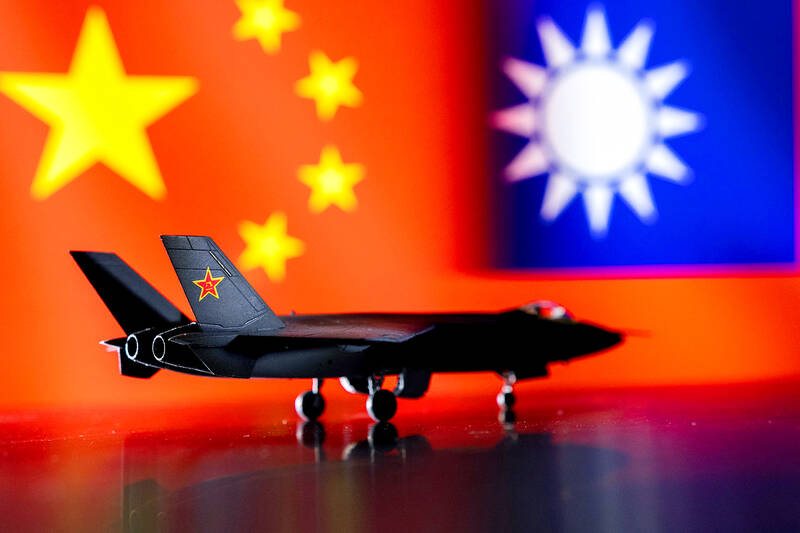If China were to impose a blockade on Taiwan, global economic output would fall by US$2.7 trillion within a year and global GDP would fall 2.8 percent, the latest Global Peace Index showed.
The loss would almost double the effects of the 2008 global financial crisis, following which global trade dropped by more than 17 percent, the report published on Wednesday by the Sydney-based Institute of Economics and Peace said.
A blockade would lead to a fall in investment and consumption, increased volatility in financial markets, a substantial drop in global trade and lower productivity and output in any sector dependent on semiconductors, the report said.

Photo: Reuters
Almost 60 percent of the loss after a blockade would occur in China and Taiwan, whose economies would shrink by about 7 percent and 40 percent respectively, it said.
Countries in Southeast Asia, including Australia, Cambodia, Singapore, South Korea and Vietnam, would be heavily affected, with falls in GDP ranging from 3 to 6 percent, it said.
The effect of a blockade would be especially strong on trade in computers and electronics as countries such as China, South Korea and Japan are highly dependent on imports of computer and electronic components from Taiwan, which is the global leader in semiconductor production, it said.
On the level of peacefulness, Taiwan was ranked 33rd among 163 countries around the world and categorized as “high” in peacefulness, the report showed.
Iceland remained the most peaceful country, a position it has held since 2008, followed by Denmark, Ireland, New Zealand and Austria.
Afghanistan was listed as the least peaceful country in the world for the eighth consecutive year, followed by Yemen, Syria, South Sudan and the Democratic Republic of the Congo.
The average level of global peacefulness deteriorated by 0.42 percent, the ninth consecutive year that measure has fallen, the report said, adding that the war in Ukraine had a significant effect on global peace.
“Over the last 15 years the world has become less peaceful,” with only two years recording year-on-year improvements in the level of global peacefulness, the report said.

AIR SUPPORT: The Ministry of National Defense thanked the US for the delivery, adding that it was an indicator of the White House’s commitment to the Taiwan Relations Act Deputy Minister of National Defense Po Horng-huei (柏鴻輝) and Representative to the US Alexander Yui on Friday attended a delivery ceremony for the first of Taiwan’s long-awaited 66 F-16C/D Block 70 jets at a Lockheed Martin Corp factory in Greenville, South Carolina. “We are so proud to be the global home of the F-16 and to support Taiwan’s air defense capabilities,” US Representative William Timmons wrote on X, alongside a photograph of Taiwanese and US officials at the event. The F-16C/D Block 70 jets Taiwan ordered have the same capabilities as aircraft that had been upgraded to F-16Vs. The batch of Lockheed Martin

GRIDLOCK: The National Fire Agency’s Special Search and Rescue team is on standby to travel to the countries to help out with the rescue effort A powerful earthquake rocked Myanmar and neighboring Thailand yesterday, killing at least three people in Bangkok and burying dozens when a high-rise building under construction collapsed. Footage shared on social media from Myanmar’s second-largest city showed widespread destruction, raising fears that many were trapped under the rubble or killed. The magnitude 7.7 earthquake, with an epicenter near Mandalay in Myanmar, struck at midday and was followed by a strong magnitude 6.4 aftershock. The extent of death, injury and destruction — especially in Myanmar, which is embroiled in a civil war and where information is tightly controlled at the best of times —

Taiwan was ranked the fourth-safest country in the world with a score of 82.9, trailing only Andorra, the United Arab Emirates and Qatar in Numbeo’s Safety Index by Country report. Taiwan’s score improved by 0.1 points compared with last year’s mid-year report, which had Taiwan fourth with a score of 82.8. However, both scores were lower than in last year’s first review, when Taiwan scored 83.3, and are a long way from when Taiwan was named the second-safest country in the world in 2021, scoring 84.8. Taiwan ranked higher than Singapore in ninth with a score of 77.4 and Japan in 10th with

SECURITY RISK: If there is a conflict between China and Taiwan, ‘there would likely be significant consequences to global economic and security interests,’ it said China remains the top military and cyber threat to the US and continues to make progress on capabilities to seize Taiwan, a report by US intelligence agencies said on Tuesday. The report provides an overview of the “collective insights” of top US intelligence agencies about the security threats to the US posed by foreign nations and criminal organizations. In its Annual Threat Assessment, the agencies divided threats facing the US into two broad categories, “nonstate transnational criminals and terrorists” and “major state actors,” with China, Russia, Iran and North Korea named. Of those countries, “China presents the most comprehensive and robust military threat